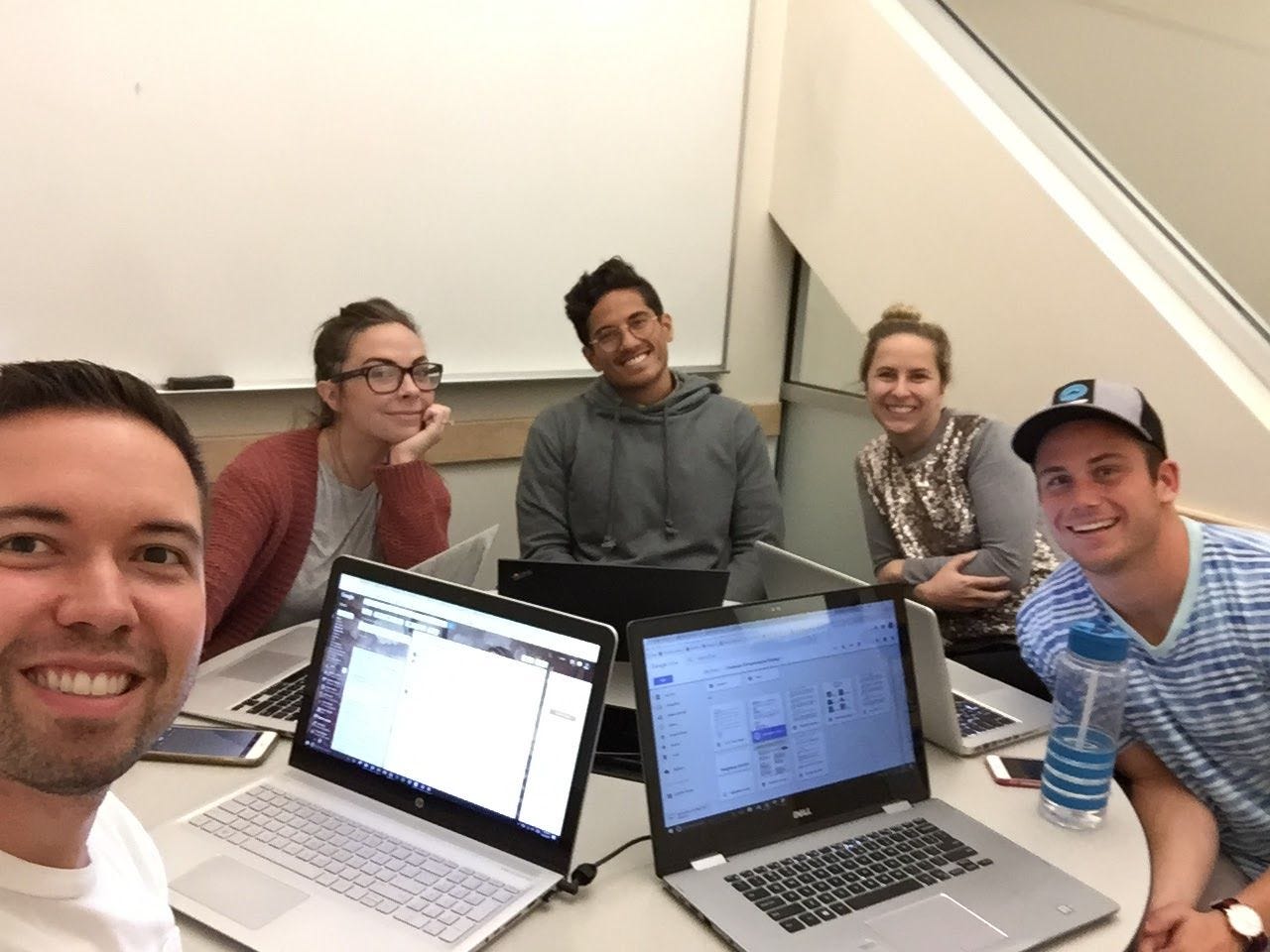Deciding on a graduate degree, a horror GMAT story, and how to live off no income
Many people wonder when (or if) they should go back to grad school. In my experience that decision is so clear that it hits you in the face in a way you can’t ignore.
I had been working for 4 years and had a stable job. While we didn’t have much money, we had enough to start putting some in a mutual fund and afford a vacation every year. We were in a nice condo where we likely wouldn’t have to move for a few years. Life was great.
But at work I was restless. Just unchallenged. This became painfully obvious when I was asked to start work on literally the exact same marketing campaign exactly 1 year to the day I had finished the last one. It was clearly time for a change.
I had started looking for other jobs but nearly all the jobs I was interested in had qualifications that said “MBA preferred” or “MBA required.” I knew nothing about getting an MBA, but determined then and there that it was time for me to get one.
Here’s my discovery journey and the transparent view of how it worked, including things like the application process, GMAT, student loans, medical coverage, and what it’s like not having an income for two years. If you’re looking at a similar change (now or in the future), read on.
Graduate Degrees: What Most People Don’t Know
I called up a few friends to get their opinion and understand how it worked. The three people I called were:
- Mark Hammer – had just finished an MBA at Duke, and was headed to Walmart
- Christie Clark – was midway through an MBA at BYU, and was headed to PepsiCo
- Terry Wang – had just finished an MBA at Harvard, was headed to an insurance private equity firm
First of all, while these all look like impressive people (they are!), I had known one since elementary school and the other two since college. They were just like me. Same age. Similar careers after our undergraduate degrees. People who get masters degrees are just people like you and me. If I could get a masters degree anyone could. Don’t doubt yourself.
In our conversations they told me a few helpful things:
MBA versus Graduate Degree. As a general rule, MBAs are helpful if you’re interested in business careers (e.g., marketing, operations, human resources, etc.). Graduate degrees are helpful if you’re interested in non-business careers (e.g., science, computers, arts, etc.).
Full-Time vs Part-Time vs Executive.
Full Time. you leave your job and go for ~2 years of school. You usually have a paid internship midway through. These programs are more rigorous and generally lead to better (high-paying) jobs and far better networking. When you think of Harvard Business School (or any elite MBA program) this is what you probably imagine.

Part-Time. Many schools offer part-time or online degrees. These are great if you’re trying to learn material or eventually switch careers. Oftentimes people with life circumstances will do these since they’re flexible. While you do earn the same degree as full-time students, in the end it often doesn’t lead to a new job or pay increase.
Executive Programs. Usually these are for people who have worked 10-20 years and need a graduate degree for their career advancement. Normally you will drive/fly to a location 1-2x per month for classes on Fridays and Saturdays. You continue working during this type of program.
Application Process. You’ll need to write some essays, submit your undergraduate grades, and take a standardized test. You take the GMAT if you’re getting an MBA and the GRE for a graduate degree. Both tests are similar, and you can read more about the differences here.
With those basics covered, here were my next steps…
Deciding on Schools: What Factors to Consider
Regret is the second-most felt human feeling, right behind love. You want to be sure you’ve made the correct decision to go back to school, and similarly that you have chosen the right school. You don’t want to live with regret.
That being said, one of my regrets is not applying to other MBA programs. After investigating a bunch of options, I ultimately decided that I wanted to attend BYU’s MBA program. I have justified it to myself and others that I wanted to stay in Utah and that the tuition was affordable.
In hindsight I should have applied to at least five schools, including Ivy League schools. My work experience, test scores, and test taking abilities likely would have been good enough to get into other schools. My MBA experience at Brigham Young University’s Marriott School was amazing, but in hindsight BYU places into tech roles and I was more interested in product companies. I also think it would have been more of a stretch/life experience to go to a different school for grad school than I went to for my undergraduate degree.
Here are a few considerations I wish I had taken into account before I only applied to a single MBA program:
Placement. You can see exactly where schools place their students and how much money they make. Here’s some examples:
- Harvard MBA – $175k starting salary / 23% of students go into consulting
- Wharton MBA – $175k starting salary / 29% of students go into financial services
- Foster MBA – $147k starting salary / 33% of students go into marketing / sales
This is all publicly available information and just takes only a few minutes to research! My MBA program places 36% of its students in technology jobs, with the top companies being Amazon, Dell, and Adobe. I didn’t want to work for these companies, so it made it especially difficult when I was trying to recruit with consumer brands since there wasn’t a great pipeline of alumni and those companies weren’t coming to my school to interview students.

Negotiating. Grad schools are fighting for the best students, so if you get into multiple schools you can leverage this to negotiate scholarships. It’s a simple call to the admissions office saying you’re debating attending and a scholarship might push you over the edge (or leverage a scholarship offer you received from a competing school). It never hurts to ask. In my case since I only applied to one school I didn’t have much leverage. I thankfully was offered a partial scholarship, but in hindsight would have probably received a full scholarship had I applied to other schools.
Cost. In my opinion this should be the smallest consideration. Most schools offer scholarships, and your earning potential afterwards is so high you’ll be able to pay back any student loans quickly.
Taking the GMAT: My Lowest Point in the Grad School Journey
I took the GMAT and it was easily the worst part of getting my degree. I studied for months. In the evenings I would study for about an hour and on Saturdays I would wake up early and study 4-6 hours. I took Sundays off since I believe it’s important to have a day of rest, and I normally spend Sundays at church and with my family.
I took a prep course online that would teach principles, have practice problems, and even practice tests! My target score was a 650, as that’s what BYU’s average GMAT score was at the time, and I had decided I would just be applying to BYU.
Can I just say how hard it was to diligently study with a full-time job and wife and two kids? SO HARD! I have an amazing wife who is so supportive, but after a long day at work and getting the house cleaned up and kids in bed, the last thing I wanted to do was to do math story problems. I generally recommend to people now after having this experience to take these standardized tests while you’re still in school. You just have more time and a better studying environment.
On Saturdays I would go to Starbucks mainly since they were open early. I’d order something small and then get to work. I worked hard. I did multiple 4-hour practice tests! On the practice tests I did well and had signed up for my test on December 5th.
I took the test and got my results back…a 610. I was heartbroken. All that studying and work, with nothing to show for it. I remember just having this pit in my stomach that I was a failure, wouldn’t be able to provide for my family, and that I wasn’t as smart as I thought. It was a terrible day.
My wonderful wife encouraged me to take it again. We were headed to Oregon for the holidays and I could take it between Christmas and New Years. So I signed up and studied like crazy.
That test day was awful. The test proctors accidentally started my test early and couldn’t reset it. So for one section where I normally would have 35 minutes for 50 questions I had only 25 minutes. I furiously took that section, again with that familiar pit in my stomach that whispered I just wasn’t good enough. While I most definitely lost points because of this error, and while I probably should have reported that test proctor to the GMAT, I got my result at the end and it was a 650 (exactly the score I needed)!
One note is I personally feel like standardized tests really reward hard studiers. Had I studied a bit more and taken it again (this time without a time deficit) I would likely have gotten up to 700+, which is the average for most Ivy League schools.

If you’re interested in taking the GMAT, I would recommend taking a GMAT prep course online. There’s many options, such as the Princeton Review, and I preferred taking an adaptive program that helped me focus on areas where I was weaker (e.g., my verbal is stronger than my quantitative).
Living without an Income: The Ins and Outs
The scariest part of going back to school was that I had to stop working for ~2 years. My school actually made me sign something saying I would not work (besides an internship) during the program. We had a little bit of savings but not enough to live off of for even a semester! I had two young kids and no family nearby, which made it next to impossible for my wife to work.
I applied for student loans, which were ~$20k per year (~$40k total). Also since we had no income, we qualified for:
- Medicaid – this essentially gave us free healthcare
- WIC (Women Infant Children) – this gave us food for our kids
- Food Stamps – this is essentially a credit card you can use to buy any food in a grocery store that is loaded with money every month
- HEAT – this helped pay our utility bills
So besides our rent and vehicles we had very few other expenses. Also all of my classmates were in a similar financial situation, so for example instead of going out to dinner we’d go over to each other’s homes. It was fantastic. Perhaps the happiest time in my life. Things were simple and we did so many free activities as a family.

The internship I did in the summer between my first and second year was paid ($30K for the summer!). They also subsidized my housing and moving expenses. This was nice to have some extra money for a rainy day, and also helped cover the cost of having our third baby that summer (note: we didn’t qualify for any of those federal programs while employed).
I’ll also add that being in school you get very long breaks. Fall break, Winter break, Spring break, and the Summer. We did quite a few car trips, since beforehand in my job I only had two weeks vacation time and now I had what felt like months!
Conclusion
The going-to-school part is far more straightforward – you go to classes, do an internship, get a degree, and sail off into the sunset with a new, shiny job.
For me it worked out better than I could have imagined. I ended up with a far better job that was more interesting and led to faster career progression. It also came with a significant pay bump.
As you decide on your path and if a graduate degree is right for you, please consider all of the factors such as what type of degree, choosing a school, how you can properly study for the GMAT/GRE, and how you can best live without an income.
And please remember, anyone can get a degree at any point in their life, including you!


